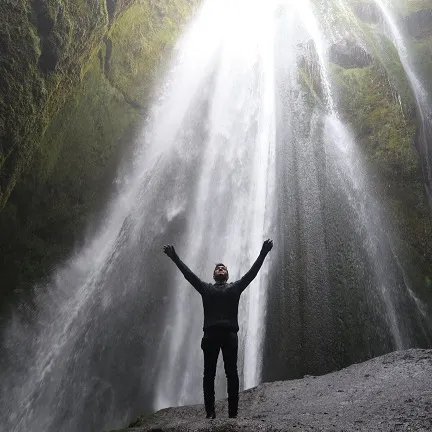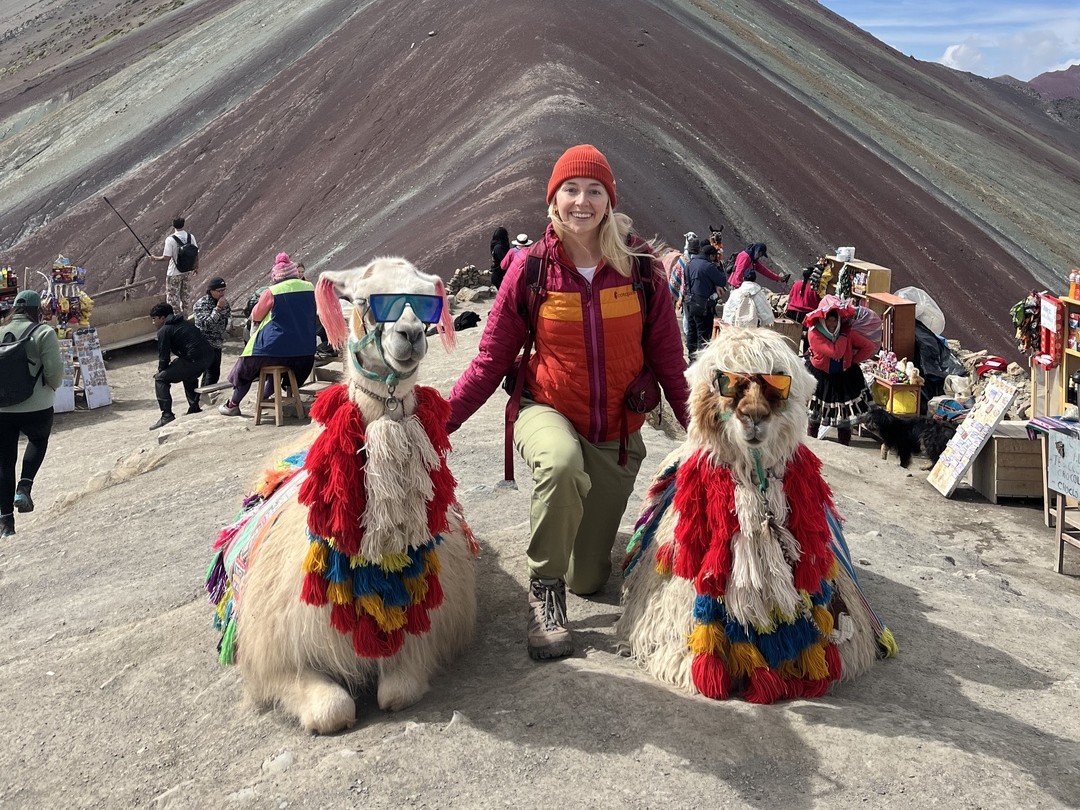Just because the days are shorter and the air is more brisk doesn’t mean that hiking becomes less enjoyable. Taking a little more precaution and adding to your pre-hike preparations will ensure that you have just as much fun on the trail in the cold season as you do in the warmer months. Before you go, be sure to follow these guidelines to keep you safe and warm.

Dress in Layers
Layering is a three-part system that includes a base layer that wicks perspiration away from your skin, a mid-layer that insulates you from the cold, and a shell layer that keeps wind and moisture out. Dressing in multiple layers makes it easy to remove or add clothing to stay comfortable. The goal is to stay dry and not sweat because if you stop hiking and your clothes are wet, you are going to feel cold. Getting wet on a cold day can put you at risk of hypothermia.
Tip: Consider wearing as few layers as possible while hiking and save the warm layers for when you take breaks.
Say NO to cotton
When cotton gets wet, it takes a very long time to dry, which can leave you feeling damp, cold, and miserable. Synthetic and wool layers dry much faster and will move perspiration away from your skin.
Tip: Don’t hesitate to invest in quality fabrics such as wool and down. These fabrics may be a bit pricier but will last longer than regular clothing and do a better job regulating your body temperatures.
Wear a hat
We lose a lot of heat through the top of our head. Keeping a winter hat on will not only keep you warm on a chilly day, but it will also help you maintain function since our heads are filled with oxygen-carrying capillaries that fuel our brains.
Tip: For longer hikes, carry along a warmer/heavier hat for breaks on the trail.
Keep your feet warm
Having cold feet and frozen toes on a hike is not pleasant. Start by protecting your feet with breathable, moisture wicking fabric such as wool to keep them dry and comfortable. Then, invest in winter hiking boots, preferably with a waterproof membrane such as Gore-Tex. Your summer hiking boots are made to maximize breathability and save weight, whereas winter boots are made to prioritize insulation and warmth.
Tip: During breaks on the trail, keep your feet out of the snow. Stand on a log or a rock instead.
Interested in hiking, read these other articles:
- Top 8 Hikes in Zion National Park
- 6 Must-do Hikes in Lake Tahoe for All Levels of Hikers
- Top 6 Hiking Destinations around San Francisco
Stay hydrated
Typically when it’s cold outside we often do not drink as much water as we need, especially when we are active. Dehydration is a common problem during cold weather because our bodies work extra hard to maintain core temperatures. Take small sips of water often and keep your water bottle close to your body, perhaps inside your jacket, to prevent the water from freezing.
Tip: Start your hike with near-boiling water and flip any extra water bottle upside down as freezing usually happens from the top down.
Eat, eat, eat
Ensuring that we are providing our bodies with enough calories is an essential part of staying warm on the trail. Bring along high-calorie snacks such as gummy candies, energy chews, nuts, jerky, cheese bites, and chocolate. Keep these snacks in your jacket pocket or an easily accessible pocket in your backpack and snack as you hike. Your body’s metabolism is its best heat source, so keep it fueled up.
Tip: Keep foods close to your body to prevent them from freezing.
Don’t forget sun protection
Just because it’s cold outside doesn’t mean we stop worrying about sunburn. This is especially true if you are hiking where there is snow on the ground. Sun rays can reflect off the white snow leading to double exposure on our faces. Be sure to apply sunscreen to the underside of your nose and chin for the best protection.
Tip: Bring along a pair of sunglasses or goggles to protect your eyes from the sun and wind.
Be Prepared for Shorter Days
A good mantra here is “Start early and know when to turn around.” Hiking in the winter typically means fewer daylight hours. Have a sense of how many usable daylight hours you have. Come sunset, darkness can set in quicker than expected and can create a more dangerous situation than you are prepared for. If the hike is taking longer than expected, be wise, and decide to turn around.
Tip: Bring along a headlamp in case you find yourself hiking after sunset.
Keep your electronics warm
Cold weather kills batteries. You don’t want to hike for several miles only to find out that your camera doesn’t function properly when you reach that viewpoint. You’ll want your phone to be working as well in case you need it as a GPS or to make an emergency call.
Tip: Carry electronics and spare batteries in a jacket pocket or close to your body to keep them warm.

As a reminder, it doesn’t have to be the middle of winter to encounter cold weather on your hiking trip. Make sure you always properly plan for all hiking trips, including checking current weather conditions.
The best way to get comfortable hiking in colder weather is to simply get outdoors during the winter months. You can expand your comfort zone by hiking in different temperatures and weather conditions. As you gain more experience, you’ll be able to make better judgments about what you need on the trail to create that ultimate hiking experience.
Heading outdoors and into nature is a great way to overcome seasonal affective disorder as well. For more tips on staying healthy this winter season, read our Health Tips: Get Sick Less and Feel Better This Winter article.
New to camping? Check out our Camping Tips: A Beginner’s Guide to Their First Trip
For more great travel guides and all of our best content make sure you are signed up to our travel blog newsletter.




.avif)


























